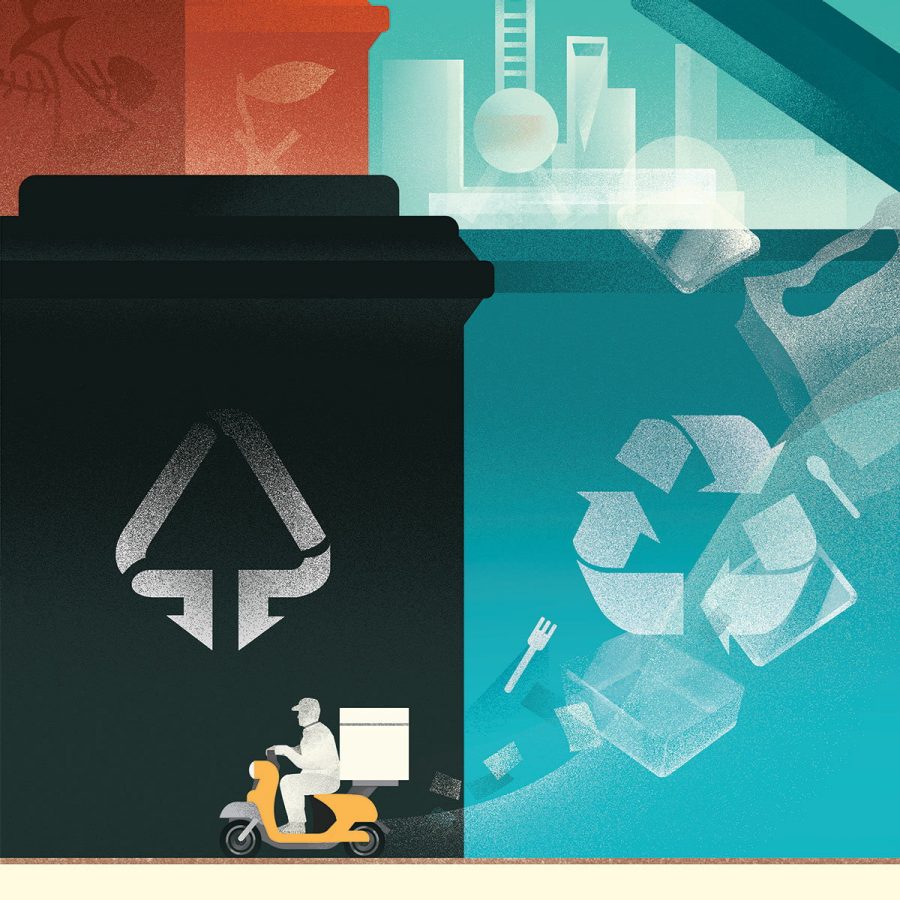How China's food industry is reducing plastic waste

Spend a minute in any Chinese metropolis and within a moment, you’ll feel the rush of air from a delivery bike speeding past. Like almost everything else in China, eating habits have transformed at a breakneck pace. A decade ago, morning trips to the vegetable market were tradition. Now, food of all sorts can be summoned to your home at the touch of a finger to your smartphone. Deliverymen rocket around, racking up hundreds of millions of trips per day across the country.
But this convenience doesn’t come without a cost. It’s estimated that more than 65 million takeaway containers are discarded every day in China. Generally made of thin, low-value plastic and covered in food residue, they never make it to recycling centres as the return is too small for the ‘informal’ collectors (often migrants to the cities) who comprise the country’s recycling system.

In recent years, though, there’s been a push to improve China’s waste management. At the beginning of 2018, China stopped receiving imported waste from other countries and turned its focus inwards. On 1 July, 2019, strict new regulations for waste-sorting came into effect in Shanghai that hold everyone from individuals and households to communities and businesses accountable. Shanghai residents must now separate their trash into four categories (recyclable, hazardous, household food and residual) or face fines of up to RMB200 (HK$220). The city is one of 46 across the country with a target, set by the central government, to recycle 35 per cent of its waste by 2020.
While the scale of change is still small, social organisations and a growing number of forward-thinking restaurants are also starting to actively address plastic waste issues. Since late 2018, El Willy , an upscale Spanish restaurant on the Bund in Shanghai, has added sustainability into its company goals. ‘Coming to China was quite a shock because everything comes in plastic,’ says Koen Vessies, executive chef of the group, recalling his arrival a decade ago. ‘I remember the first time receiving orders here. For instance, lemons arrived in a plastic bag within a big bag, but then each individual fruit was wrapped again in more plastic. Even then we pushed our suppliers to just bring it in a crate and forgo the plastic.’ Over the past year, in a concerted effort towards greater sustainability, which includes initiatives such as the introduction of a vegan menu, the 10-year-old restaurant has made moves to swap out plastic straws for paper ones and employ reusable containers instead of cling film in the kitchen.
Often, it’s health-focused restaurants, or those with an existing environmental bent, leading the charge. Tribe Organic , which has locations in Beijing and Shanghai, uses boxes made from bamboo pulp, and reusable bags that can be returned for small discounts on its meal delivery plans, while health food cafe Moka Bros , with branches in Beijing, Shanghai and Chengdu, recently launched a reusable bottle programme with free coffee upgrades as an incentive.
One major challenge for restaurants is cost. Traditional petroleum-based plastics are cheap, while alternatives are not. In April, farm-to-table, fast-casual restaurant Hunter Gatherer in Shanghai switched to polylactide (PLA), a bio-plastic made from plant starch, for its cups and straws. The eatery also offers reusable cutlery packs made of wood and bamboo, wrapped in upcycled denim cases made by local company UseDem, which customers can present for discounts. ‘Our straws are paper, our cold drink cups – the lid and the body – are PLA, which are six months biodegradable and four times the cost. The straw? Eight times the cost,’ says Lucy Hu, Hunter Gatherer’s marketing director.
In order to achieve economies of scale for the production of environmentally friendly packaging options, there must be enough customer demand. Since 2016, Beijing-based non-profit GoalBlue has worked on exactly that. ‘We’re focused on influencing customer behaviour changes towards environmental issues,’ says founder May Mei. One of GoalBlue’s three areas of focus is reducing the use of plastic, which it promotes through schools and social media platforms as well as through a new programme called iCare, which provides consumers with recommendations for responsible restaurants and businesses, such as those using more environmentally friendly packaging.
Another approach is to avoid plastic packaging altogether. Delivery-only business Yikou Liangshi, established in 2014 by Wen Yuchen, employs its own team to transport meals packed in ceramic dishware with reusable cutlery that they automatically retrieve 90 minutes after drop-off. But, surprisingly, sustainability is not the underlying motive for the start-up kitchen’s zero-plastic takeaway model. ‘It’s less about being eco-friendly or sustainable, to be honest,’ says Wen, who explains that the idea was to create the feeling of home comforts, where you eat off real dishes instead of out of plastic.
Nevertheless, Yikou Liangshi caught the eye of Greenpeace East Asia ’s Beijing office, which is starting a plastic reduction advocacy programme. It’s essentially playing a matchmaker role to partner restaurants who’ve successfully reduced plastic with ones eager to do so, explains the project’s campaigner Xu Wenjing.

Another leading example tapped by Greenpeace is Beijing pizza company Gung Ho. Currently, it works in partnership with food delivery service Meituan , which launched its own environmental protection division, Blue Mountain, in 2017. Gung Ho has also teamed up with Australian packaging manufacturer Detpak to develop a new pizza box which uses 50 per cent less material than usual. The new box is made of FSC-certified paper, and comes with a paper version of the little white plastic table that supports a pizza box’s lid. ‘It’s quite possibly the very first one in the world, which is ridiculous,’ says Gung Ho’s sustainability manager, Kerry Lim. ‘But it is actually because there’s just no alternative.’
When it comes down to it, everyone seems to agree that policy is paramount. ‘If there’s more serious regulation for restaurants in terms of sorting the trash, then I’m sure that it will change very fast,’ says Min Ko, director of B Corps China , an independent taskforce that certifies businesses’ commitments to high environmental and social standards. ‘One thing China does well when change happens is it speeds up at a pace quicker than any other country. In that way, I’m optimistic.